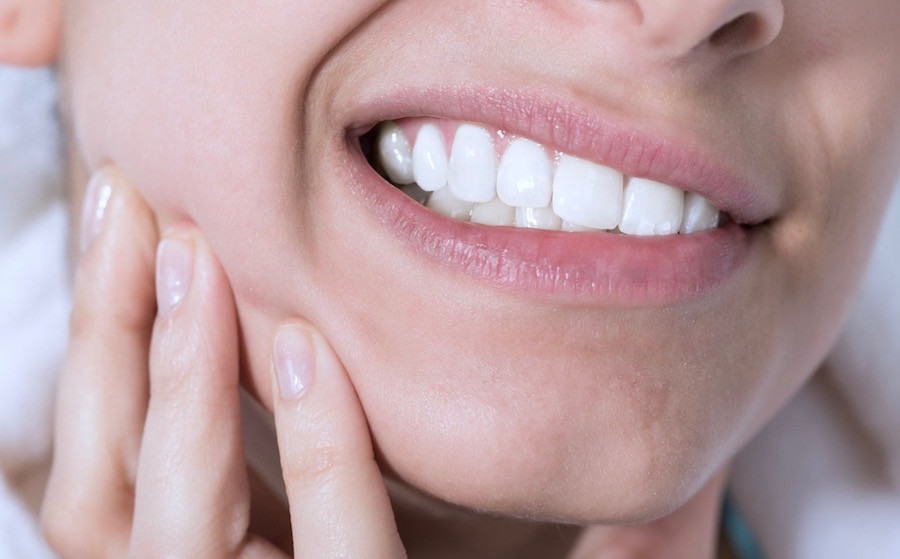
Studies show that approximately 8 percent of adults and 14 percent of children in Canada grind their teeth at night. Then there those who do so out of habit and/or stress during waking hours, further adding to the prevalence of this condition across the nation. Many people are unaware of the fact that they grind or clench their teeth, and without a dental examination to deliver a call to corrective action, the damage done can be severe.
You may be experiencing symptoms at this very moment, which can include fascial pain, earaches, pain and/or stiffness in the jaw, teeth sensitivity, cracked or fractured teeth, worn down teeth, and sleep disruption. Physiotherapy clinics even credit bruxism for persistent headaches and migraines. Not only does teeth grinding deliver significant discomfort, it will destroy tooth enamel which is a major concern because once gone, your body cannot repair or replace it as it is not a living tissue.
If you are grinding your teeth, you will need to take immediate action to keep this dental health concern from getting worse. Today, Vancouver Dental Specialty Clinic is here with effective advice on how to put an end to the practice.
5 Tips That Can Help You Stop Grinding Your Teeth and Prevent Further Damage
1. Cut Back on Alcohol, Coffee, Cigarettes, and…Chocolate?
What you put in your body can lead to or support the act of teeth grinding. Recent research shows a positive correlation between the consumption of alcohol, caffeine, and tobacco and teeth grinding. On their own, each is a conduit to the act, so if you are consuming all three you further increase the risk.
And what’s this about chocolate? Well, since chocolate contains about 79 milligrams of caffeine per 2-ounces, it is also a candidate for removal, as are colas, energy drinks, and other foods/beverages that contain the common central nervous system stimulant.
2. Seek to Reduce Anxiety and Stress
Anxiety and stress are precursors to teeth grinding. Numerous studies show that various pathological emotional experiences often result in the development of a muscular parafunctional habit in the form of teeth grinding.
If you are experiencing stress at work, home, or anywhere in your life for that matter, you should do all that you can to better manage it. The American Psychological Association (APA) has laid out some helpful tips on how to reduce stress, which includes an exercise regime, meditation, seeking social support, smiling and laughing more, and removing yourself from stressful situations whenever possible. HealthLink BC also suggests taking on an activity such as writing which will allow you to channel your stress in a more positive manner. In the end, those predisposed to teeth grinding will be well served with better anxiety and stress management.
3. Putting an End to Bad Chewing Habits…and Gum?
In some instances, teeth grinding and jaw clenching is simply a bad habit that can effectively be broken with discipline. If you find yourself chewing on non-food items (pens, pencils, straws, etc.) you allow your jaw muscles to adapt the habit of clenching, which makes you more likely to grind your teeth. And yes, this includes the act of chewing gum so it may be best to stick to sugar-free mints and leave the Hubba Bubba and Juicy Fruit on the shelf.
You will have to retrain your brain (and thus jaw muscles) to not grind or clench your teeth, so whenever you notice that you are about to grind or clench during waking hours, place the tip of your tongue between your teeth, which is a practical yet effective way to train your jaw muscles to relax.
4. Relaxing Your Jaw Muscles Before Sleep
Given that most teeth grinding occurs at night (more on this below) you should consider a simple “before bed” regime that involves placing a warm washcloth or warm gel pack against your cheek, just in front of where your earlobe is located. This will help relax the jaw and minimize the act of clenching as you head for your pillow.
5. Coming to Terms with Bruxism
Bruxism is teeth grinding, but what many people do not realize is that it is also classified as a sleep disorder. Given that chewing is a neuromuscular activity that is controlled by a subconscious process, it can become more active during sleeping hours which results in the parafunctional act addressed today. In being diagnosed with bruxism by a dental specialist near you, you open your world up to a treatment that can effectively eradicate the damaging effects. This treatment (available at our Vancouver clinic) includes the application of a custom night guard, which will protect your teeth and relieve pressure on your Tempromandibular Joint. Learn more about how your dental specialist will help stave off bruxism.
If you have any questions about the above, and/or want to restore the health of your damaged teeth, be it from grinding, clenching, or other issue, we encourage you to contact Vancouver Dental Specialty Clinic at 604.336.0958 at your earliest convenience.



